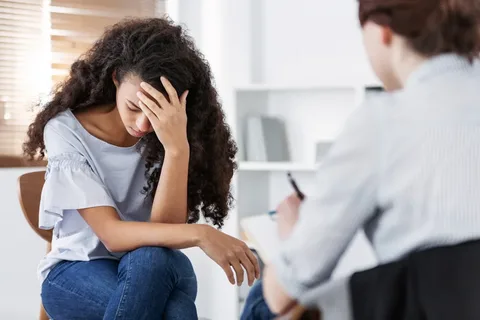Post-Traumatic Stress Disorder Post-Traumatic Stress Post-Traumatic Stretch Clutter, commonly alluded to as PTSD, is a mental wellbeing condition that influences millions of individuals around the world. It happens when somebody encounters or witnesses a traumatic occasion, such as war, normal catastrophes, mishaps, or mishandles. PTSD can influence individuals of all ages, from children to grown-ups, and can have a critical affect on everyday life if cleared out untreated. In this web journal post, we will investigate what PTSD is, its side effects, causes, medicines, and how to offer assistance to somebody who may be battling with it.
What is PTSD, or Post-Traumatic Stress Disorder? PTSD
PTSD is a mental wellbeing clutter that creates after somebody goes through a traumatic occasion. A traumatic occasion can be anything that causes serious fear, defenselessness, or frightfulness. Cases of traumatic occasions include:
- Military combat
- Natural fiascos (like typhoons or earthquakes)
- Serious car accidents
- Physical or sexual assault
The sudden passing of an adored one
After encountering injury, it is common for individuals to feel anxious or on edge. Be that as it may, for a few, these sentiments endure and decline over time, driving to PTSD. This clutter can meddle with day-to-day life, connections, and work. Understanding the side effects and looking to offer assistance early can make a huge difference.
Symptoms of PTSD
PTSD side effects, as a rule, show up inside a month after the traumatic occasion, but in a few cases, they can take a long time to surface. The indications of PTSD are assembled into four primary categories:
1. Meddlesome Memories of Post-Traumatic Stress Disorder (PTSD)
People with PTSD frequently remember the traumatic occasion through flashbacks or bad dreams. These recollections can feel exceptionally genuine and cause trouble. A few common meddling memory side effects include:
- Flashbacks (feeling like the occasion is happening again)
- Nightmares approximately the event
Disturbing considerations or sentiments almost the occasion, indeed when not considering around it
2. Avoidance of Post-Traumatic Stress Disorder PTSD
Avoiding things that remind you of the traumatic occasion is another side effect of PTSD. This might cruel dodging certain places, individuals, or exercises. Shirking can lead to separation and make it difficult to do every-day exercises. Common shirking indications include:
- Staying absent from places or exercises that remind you of the trauma
- Avoiding talking or considering around the event
3. Negative Changes in Considering and Mood
PTSD can lead to negative considerations and sentiments approximately yourself and others. You may feel sad around the future or have inconvenience recollecting parts of the traumatic occasion. Indications in this category include:
- Negative considerations, almost yourself or others
- Feeling sad almost the future
- Memory problems
- Difficulty keeping up near relationships
- Feeling confined from family and friends
4. Changes in Physical and Passionate Reactions
People with PTSD may feel on edge or be effortlessly startled. They might have trouble resting or controlling their outrage. This is frequently called “hyperarousal.” A few indications of this include:
- Being effectively startled or frightened
- Trouble sleeping
- Difficulty concentrating
- Irritability or outrage outbursts
- Engaging in destructive behavior
- Causes of PTSD
While anybody can create PTSD, certain components can increment the probability of encountering it. These variables include:
1. Traumatic Events
The nature of the traumatic occasion plays a huge part in the improvement of PTSD. Occasions that are especially serious or drawn out are more likely to cause PTSD.
2. Individual Factors
Certain individual components, such as your personality or family history, can increase your chance of creating PTSD. People who have a history of misery, uneasiness, or other mental wellbeing disturbances may be more vulnerable.
3. Need of Support of Post-Traumatic Stress Disorder PTSD
After a traumatic occasion, having a bolstered framework of family and companions can offer assistance and avoid PTSD. On the other hand, feeling separated or alone may increase your hazard of creating PTSD.
4. Rehashed Presentation to Trauma
People who are exposed to injury over and over, such as responders, police officers, or warriors, are at a higher hazard of creating PTSD. This is since their presentation to traumatic circumstances happens frequently.
Diagnosing PTSD
PTSD is analyzed by mental wellbeing experts based on the nearness of side effects that are final for at least one month after the traumatic occasion. A specialist may inquire almost your history, indications, and how they are influencing your day-to-day life. It’s basic to look for proficient assistance if you or somebody you know may have PTSD, as early mediation can lead to superior outcomes.
Treatment Choices for PTSD of Post-Traumatic Stress Disorder PTSD
The great news is that PTSD is treatable. A few treatment alternatives can offer assistance, diminish side effects, and move forward in quality of life.
1. Therapy Post-Traumatic Stress Disorder (PTSD)
Psychotherapy, or conversation treatment, is one of the most successful medicines for PTSD. Two common sorts of treatment for PTSD include:
- Cognitive Behavioral Treatment (CBT): This treatment makes a difference in how people distinguish and alter negative thought designs. A sort of CBT called Cognitive Preparing Treatment (CPT) is frequently utilized to offer assistance individuals prepare and make sense of their trauma.
- Exposure Treatment: This treatment makes a difference. Individuals stand up to their injury in a secure environment, decreasing their fear and uneasiness over time.
2. Medication
Medication can, moreover, be supportive in overseeing PTSD side effects. A few commonly endorsed medicines incorporate antidepressants, such as Specific Serotonin Reuptake Inhibitors (SSRIs), which offer assistance in diminishing uneasiness and depression.
3. Bolster Groups
Joining a bolster bunch can give a secure space to share encounters with others who get what you’re going through. Back bunches can moreover diminish sentiments of confinement and loneliness.
How to Back Someone with PTSD
If you know somebody with PTSD, there are ways you can offer assistance to them through their recuperating process. Here are a few accommodating tips:
- Be Understanding and Understanding: PTSD can cause disposition swings or make it difficult for somebody to express their sentiments. Being understanding and appearing compassionate can go a long way.
- Encourage Proficient Offer assistance: Recommend treatment or therapeutic treatment if your adored one is struggling.
- Avoid Triggers: Offer assistance and help them maintain a strategic distance from circumstances that might trigger excruciating memories.
- Offer Back without Weight: Let them know you’re there for them without pushing them to conversation around their injury unless they’re ready.
Coping Procedures for PTSD Post-Traumatic Stress Disorder PTSD
In addition to proficient treatment, there are adapting techniques that people with PTSD can utilize to oversee their symptoms:
- Mindfulness and Unwinding: Practicing mindfulness or reflection can offer assistance diminish push and move forward passionate control.
- Exercise: Physical action has been shown to offer assistance and decrease indications of uneasiness and depression.
- Healthy Way of life Choices: Eating an adjusted count of calories, getting sufficient rest, and maintaining a strategic distance from liquor or drugs can progress generally well-being.
When to Look for Help of Post-Traumatic Stress Disorder PTSD
It’s critical to reach out and offer assistance if you or a cherished one is encountering indications of PTSD. If these side effects meddle with day-to-day life, connections, or work, looking for treatment from a mental wellbeing professional is critical.
The National Founded of Mental Wellbeing (NIMH) gives extra assets and data around PTSD. You can visit their site to learn more about almost this clutter and accessible treatments.
Conclusion
Post-Traumatic Stretch Clutter (PTSD) is a genuine condition that can influence anybody who has gone through a traumatic occasion. Be that as it may, with the right treatment and bolster, people with PTSD can lead solid, satisfying lives. Early intervention, treatment, and a solid support framework are key in overseeing PTSD. If you or somebody you know is battling with PTSD, don’t delay to look for help.
To learn more approximately PTSD, visit the National Center for PTSD, which offers profitable data and assets for people and families influenced by this condition.
FAQs
Q1: Can children get PTSD?
Yes, children can create PTSD if they are involved in or witness a traumatic occasion. Their indications may contrast somewhat from grown-ups, such as bed-wetting or getting to be curiously clingy with parents.
Q2: How long does PTSD last?
PTSD side effects can last for months or indeed a long time. Be that as it may, with appropriate treatment, numerous individuals will experience critical enhancement or indeed full recovery.
Q3: Is PTSD as it were caused by combat?
No, PTSD can result from any traumatic occasion, not fair combat. Individuals can create PTSD after mischances, attacks, common calamities, or other traumatic experiences.
Q4: Can PTSD be prevented?
While there is no beyond any doubt way to avoid PTSD, early mediation and back after a traumatic occasion can decrease the probability of creating it.
Q5: Is there a remedy for PTSD?
There is no remedy for PTSD, but with treatment, numerous individuals can oversee their side effects and lead satisfying lives.



